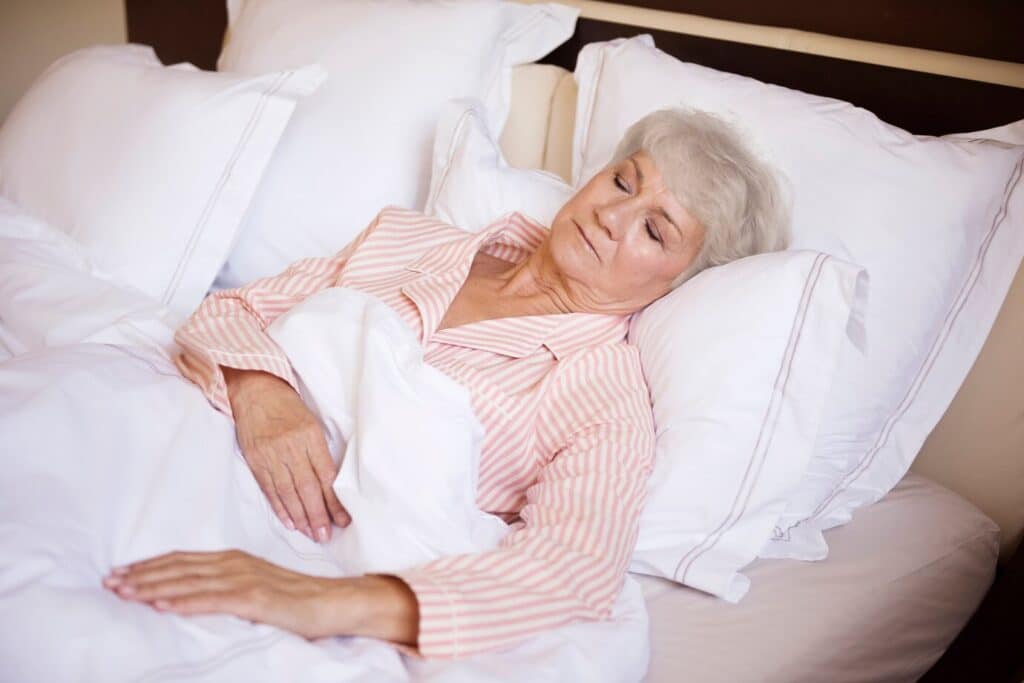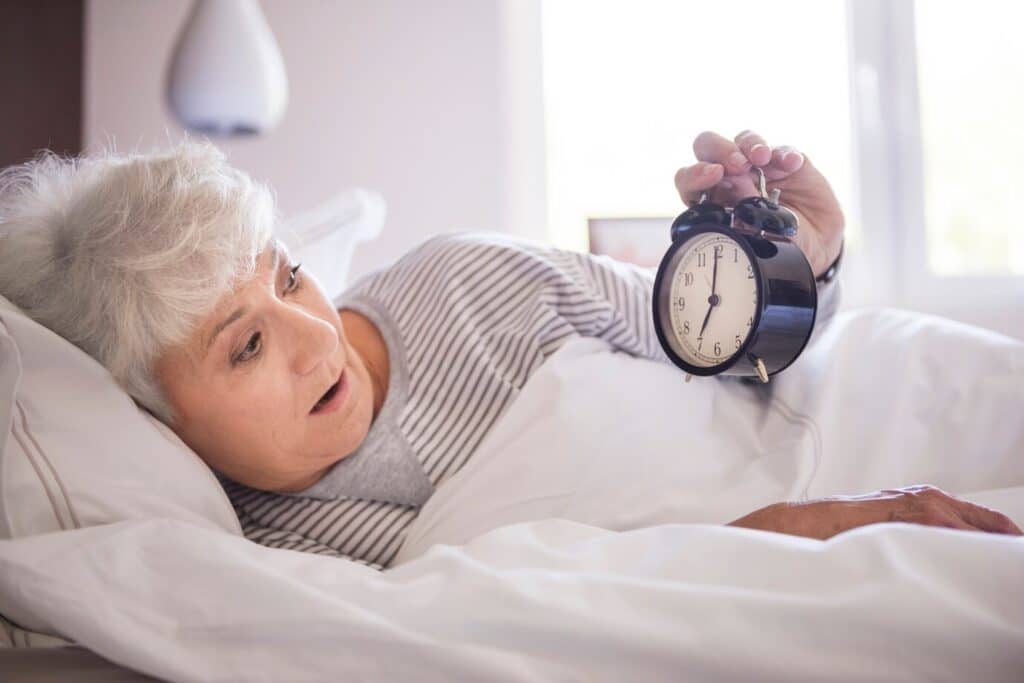Insomnia in Seniors: Understanding Their Sleep Needs
Insomnia in seniors is more common than many realize, and understanding its causes and solutions can lead to healthier, more restful nights. As people age, changes in their sleep patterns can make getting the recommended 7 to 9 hours of quality rest difficult. While occasional sleeplessness might not raise alarms, persistent issues may point to deeper problems.
At Westmont of Morgan Hill, we recognize the vital role that sleep plays in senior health. Whether you’re exploring a remedy for insomnia for elderly loved ones or are looking into natural remedies for insomnia in the elderly, it’s important to understand what’s at stake. From managing medications to improving lifestyle habits, there are numerous strategies seniors can implement to enjoy better sleep and improved well-being.
Changes in Sleep Patterns With Age
As you age, it’s natural to notice shifts in how and when you sleep. Many seniors experience lighter sleep, more frequent awakenings, and early-morning wake times. This is often due to the body’s shifting circadian rhythm and a decreased ability to process these signals effectively.
These changes can lead to insomnia in seniors, which may cause fatigue, irritability, and health issues. Establishing a structured bedtime routine and learning about natural remedies for insomnia in elderly individuals can greatly improve sleep quality. Restful sleep is critical for maintaining overall health, from mental clarity to immune strength.
Recognizing Insomnia Symptoms in Seniors
Identifying the signs of insomnia in elderly women and men is essential for early intervention. Some of the most common symptoms include:
- Difficulty falling or staying asleep
- Waking up too early and being unable to fall back asleep
- Daytime fatigue, mood changes, or resistance to sleep routines
These symptoms can stem from various causes including stress, environmental disruptions, or even drugs that cause insomnia in elderly individuals. If these signs persist, professional guidance may be needed to develop a personalized sleep improvement plan. Additional insights can be found in this blog on insomnia symptoms.

Effects of Insomnia on Daily Life
Chronic insomnia affects every part of your day, making once-simple tasks feel difficult and exhausting. Whether you’re experiencing it firsthand or caring for someone who is, it’s crucial to understand the emotional and physical toll it takes.
Daytime Fatigue Consequences
When seniors don’t get enough sleep, the consequences go far beyond just feeling tired:
- Low energy and reduced participation in social activities
- Impaired cognitive functioning, including forgetfulness and slow reaction times
- Higher risk of accidents and falls, especially at home
It’s important to understand that these issues are not simply part of aging. Persistent sleep difficulties should be addressed using a remedy for insomnia for elderly patients, including behavior changes and medical guidance. For more insight, read about how sleep issues are not a normal consequence of aging here.
Mood and Concentration Impact
Without proper sleep, seniors may also face emotional challenges, including:
| Emotional Effects | Impact on Life |
| Irritability | Strained relationships |
| Sadness or anxiety | Withdrawn behavior |
| Lack of motivation | Reduced participation in routines |
| Trouble focusing | Increased errors and forgetfulness |
Treating insomnia in seniors can help stabilize emotions and improve cognitive function, which is especially important for aging adults who want to maintain their independence.
Effective Treatment Options for Insomnia
Thankfully, there are several solutions to help seniors reclaim better sleep.
Behavioral Treatments
- Cognitive Behavioral Therapy for Insomnia (CBT-I) is one of the most effective, evidence-based treatments available.
- Sleep hygiene education, which includes teaching healthy habits like avoiding screens before bed and keeping a regular bedtime.
- Relaxation techniques such as meditation and breathing exercises.
Medication Considerations
Sometimes, medications may be necessary. However, choosing the right medication for insomnia in the elderly is critical. Some options can cause side effects or dependency. Always consult with a healthcare provider before starting any new treatment.
Also, be aware of drugs that cause insomnia in elderly adults, including some antidepressants, corticosteroids, and blood pressure medications. If these are contributing to poor sleep, a physician may adjust dosages or suggest alternatives.
Common Sleep Disorders in Older Adults
Sleep disorders like sleep apnea, restless legs syndrome (RLS), and periodic limb movement disorder can also contribute to insomnia in seniors. Recognizing the symptoms of these conditions is crucial for identifying the best course of treatment.
For example, sleep apnea involves pauses in breathing during sleep, which can lead to fatigue and serious health issues. RLS, on the other hand, causes an irresistible urge to move the legs and can severely impact falling asleep.
Seniors should not hesitate to seek help if they suspect a disorder is affecting their sleep.
Lifestyle Adjustments for Better Sleep Quality
Improving your sleep doesn’t always require medication. In fact, some of the best natural remedies for insomnia in elderly people involve simple lifestyle changes:
- Create a sleep-friendly environment with a cool, quiet, and dark room.
- Avoid caffeine and heavy meals in the evening.
- Stay active during the day to encourage better nighttime sleep.
These changes, when paired with good sleep hygiene, can serve as an effective remedy for insomnia for elderly individuals and help avoid or reduce reliance on medication for insomnia in the elderly.
To expand your understanding and get expert-approved guidance, consider exploring these external resources:
- National Institute on Aging – Sleep and Aging
- Sleep Foundation – Aging and Sleep
- Mayo Clinic – Senior Health: Sleep Tips
These sources offer valuable tips, research-backed advice, and deeper insights into managing insomnia in elderly women, men, and individuals with coexisting medical conditions.
The Power of Restful Sleep: Take Back Your Nights
At Westmont of Morgan Hill, we understand that addressing insomnia in seniors is more than just improving sleep—it’s about restoring joy, energy, and independence in daily life. By staying informed and proactive, you can explore personalized treatment paths that include natural remedies for insomnia in elderly, lifestyle changes, and when needed, careful use of insomnia in elderly medication.
If you or a loved one is struggling with insomnia in elderly women or is unsure if current medications are contributing to sleep issues, we’re here to help. Our team is committed to helping residents discover healthier rest and more vibrant days.
Call us at 408-779-8490 or schedule a visit at Westmont of Morgan Hill to learn more about our supportive community and personalized care plans.
Discover the level of care you or your family member requires. What Level of Care Do You Need?
Frequently Asked Questions
How do you treat insomnia in the elderly?
Treatment for insomnia in the elderly often begins with improving sleep hygiene, such as maintaining a consistent bedtime, avoiding caffeine late in the day, and creating a restful sleep environment. Cognitive Behavioral Therapy for Insomnia (CBT-I) is also effective and preferred over medication. In some cases, doctors may recommend short-term use of sleep aids, but these should be used cautiously due to potential side effects. It’s important to tailor treatment to the individual’s health conditions and lifestyle.
How do you get an elderly person to sleep through the night?
Helping an elderly person sleep through the night involves setting a calming bedtime routine and minimizing disturbances like light, noise, or late-night eating. Encouraging daytime activity and exposure to natural light can help regulate their internal clock. Avoiding long naps and limiting screen time before bed also supports better sleep. If sleep problems persist, consulting a healthcare provider is recommended to rule out underlying conditions.
What is the most common sleep problem in the elderly?
The most common sleep issue in older adults is insomnia, which includes trouble falling or staying asleep. This condition can stem from age-related changes in sleep patterns, health conditions, or medication side effects. Many seniors also experience fragmented sleep or wake up frequently during the night. Addressing these issues often requires a mix of lifestyle changes and medical guidance.
Why can’t older people sleep through the night?
Older adults often experience disrupted sleep due to changes in their circadian rhythm, which can cause them to feel sleepy earlier and wake up earlier. Health issues such as arthritis, sleep apnea, or the need to use the bathroom frequently can also interrupt sleep. Medications and emotional factors like anxiety or depression may contribute as well. Identifying and managing these factors is key to improving sleep quality.









